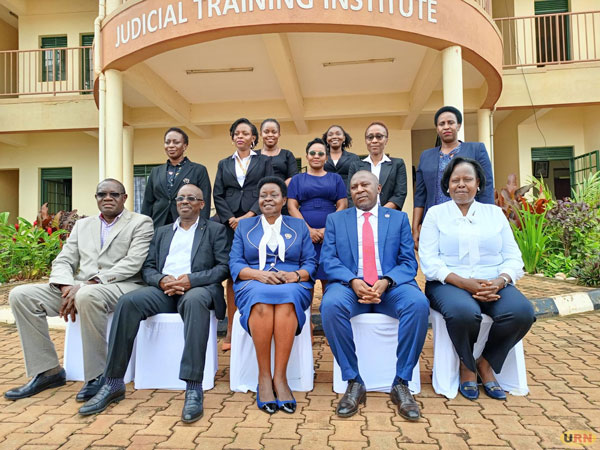
Kampala, Uganda | THE INDEPENDENT | The Judiciary has asked members of the Tax Appeals Tribunal -TAT to always focus on facts in legal disputes before them other than dwelling in technicalities which scare away tax payers.
According to the head of the Civil Division of the High Court Justice Musa Ssekaana, tax payers are more comfortable having their disputes resolved by the Tax Appeals Tribunal as opposed to a court of law and as such, he has asked members of TAT to be flexible, simple and transparent while handling tax disputes before them.
Justice Ssekaana made the remarks while officiating at a week long training of the TAT members at the Judicial Training Institute in Kampala.
The TAT was established by an Act of Parliament in 1997 and it opened its doors to the public in May, 1999. The tribunal was set up as a specialized court to provide the tax payer with easily accessible, efficient and independent arbitration in tax disputes with the Uganda Revenue Authority -URA.
However, Ssekaana has reminded them to know that they are a special tribunal which should show their expertise in tax disputes and desist from copying the operations of courts of law that engage in legal jargons and technicalities .
He also rechoed the functions of the tax tribunal as reducing incidences of tax evasion because the tax payers expect the tribunal to be fair and more transparent than a court of law. He said they should also minimize delays and bottle necks in arbitration of tax disputes and also create an avenue of interrogation of parties, so as to probe further .
Ssekaana explained that if the tribunal thinks a Uganda Revenue Authority official -URA is hiding something or information, they should demand for it. He said if that official doesn’t want to step before the tribunal to defend their personal decisions, the tribunal should summon them and demand explanations as to why did they make such decisions that is causing a dispute.
According to Ssekaana, the URA senior officials should stop sending their juniors because when the tribunal doesn’t engage the top decision makers, they will continue hearing same cases with same mistakes instead of them changing and eventually reduce on the backlog.
On her part, the head of Judiciary Training Institute -JTI Lady Justice Damalie Lwanga said the training is taking place when most of the members of TAT are executing their duties and they know what happens . She said the Tribunal members led by Asa Mugenyi the Chairperson, however are going to acquire new skills which should benefit both the tribunal and the people they serve.
Lwanga has asked them to avoid case backlog saying it’s not easy to resolve, and they should deliver their decisions timely. She says they should avoid issues that can cause bias and make decisions that are defendable such that in the end, both the tax payer and the collector are treated impartially.
“Avoid instances of bias, always serve with integrity, humility, transparency, diligence, utmost sobriety, be effective in execution of your work, make decisions that can be defended in law and resolve the disputes fairly. Treat both the tax collector and tax payer as equal litigants,” said Lwanga.
According to Lwanga, TAT is becoming more and more visible and vibrant today in Uganda; but also in the justice system and the existence of the Tribunal as an appeals mechanism saves the parties who are dissatisfied with the decisions of the URA from the lengthy court processes.
She said it also relieves the courts of law of having to hear and adjudicate on disputes which could be resolved through administrative channels.
“As you perform your duties, you must always remember the purpose for which the Tribunal was established. It is a creation of the legislature, intended to resolve disputes through hearing appeals from members of the public who are dissatisfied with the decisions of the URA,” added Lwanga.
***
URN
 The Independent Uganda: You get the Truth we Pay the Price
The Independent Uganda: You get the Truth we Pay the Price



Justice Ssekaana’s advice on fostering a conducive environment for dialogue and the need for impartiality resonated with me. In tax-related disputes, a fair and unbiased approach is essential to build trust and maintain the integrity of the taxation system. Moreover, the emphasis on alternative dispute resolution methods, such as mediation and arbitration, is noteworthy. These approaches can often lead to quicker and more amicable solutions, which benefit all parties involved I appreciate the emphasis on transparency and open communication channels, which can help to reduce misunderstandings and facilitate the resolution process. In summary, Justice Musa Ssekaana’s guidance serves as a reminder of the importance of fairness, efficiency, and transparency in resolving tax-related disputes. These principles are not only beneficial for taxpayers but also contribute to a more robust and equitable tax system overall. https://irs-offices.com